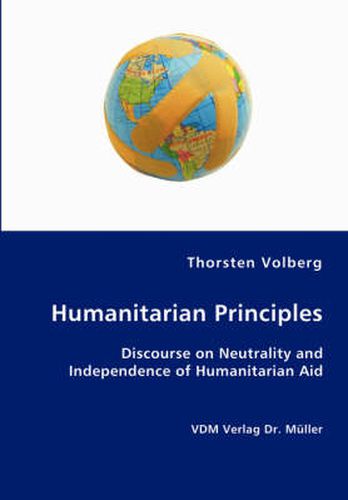Readings Newsletter
Become a Readings Member to make your shopping experience even easier.
Sign in or sign up for free!
You’re not far away from qualifying for FREE standard shipping within Australia
You’ve qualified for FREE standard shipping within Australia
The cart is loading…






This title is printed to order. This book may have been self-published. If so, we cannot guarantee the quality of the content. In the main most books will have gone through the editing process however some may not. We therefore suggest that you be aware of this before ordering this book. If in doubt check either the author or publisher’s details as we are unable to accept any returns unless they are faulty. Please contact us if you have any questions.
The humanitarian principles of humanity, neutrality and impartiality provide an ethical framework that defines and delineates the humanitarian space within which relief agencies are supposed to operate. Current experiences, however, show that these traditional principles were not designed to cope with the development underlying the increasing merging of humanitarian aid and politics. To avoid political manipulation, relief organizations must rethink these principles and face the responsibility of getting more involved in the broader political arena to be able to take appropriate action, and to avoid long-term damages on a society. The author examines the difficult realities in a heterogenic humanitarian environment, by addressing all the complex legal and political issues surrounding an emergency, including the impact of external actors like donors, host governments, and armed forces. It therefore provides a realistic understanding for everyone who is working in the field of humanitarian aid and development policy of the possibilities and limits of being neutral and impartial in current crisis responses. In this regard, the paper further analyzes the ‘Sphere’ process on how far it is taking political influences on humanitarian aid into consideration, and can thus actually be seen as a reasonable guideline for relief organizations in the 21st century.
$9.00 standard shipping within Australia
FREE standard shipping within Australia for orders over $100.00
Express & International shipping calculated at checkout
This title is printed to order. This book may have been self-published. If so, we cannot guarantee the quality of the content. In the main most books will have gone through the editing process however some may not. We therefore suggest that you be aware of this before ordering this book. If in doubt check either the author or publisher’s details as we are unable to accept any returns unless they are faulty. Please contact us if you have any questions.
The humanitarian principles of humanity, neutrality and impartiality provide an ethical framework that defines and delineates the humanitarian space within which relief agencies are supposed to operate. Current experiences, however, show that these traditional principles were not designed to cope with the development underlying the increasing merging of humanitarian aid and politics. To avoid political manipulation, relief organizations must rethink these principles and face the responsibility of getting more involved in the broader political arena to be able to take appropriate action, and to avoid long-term damages on a society. The author examines the difficult realities in a heterogenic humanitarian environment, by addressing all the complex legal and political issues surrounding an emergency, including the impact of external actors like donors, host governments, and armed forces. It therefore provides a realistic understanding for everyone who is working in the field of humanitarian aid and development policy of the possibilities and limits of being neutral and impartial in current crisis responses. In this regard, the paper further analyzes the ‘Sphere’ process on how far it is taking political influences on humanitarian aid into consideration, and can thus actually be seen as a reasonable guideline for relief organizations in the 21st century.